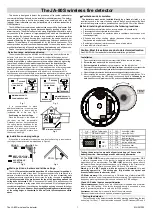
11
www.viavito.com
If you’re beginning an exercise program
for the first time or starting a new exercise
program, you must check with your doctor
that you are fit to do so, particularly if:
• You have been diagnosed with heart
problems, high blood pressure or other
medical conditions.
• You have not exercised for over a year.
• You are over 35 and do not currently
exercise.
• You are pregnant or are a new mother.
• You have diabetes.
• You have chest pain, or experience
dizziness or fainting spells.
• You are recovering from an injury
or illness.
Workout tips
• Always perform a warm-up and
stretching exercises before your
workout and a cool-down and
stretching exercises at the end.
• Start slowly and build up your time,
speed and resistance gradually; doing
too much too soon can lead to injuries.
• If you are sore or tired, give yourself
a few extra days to recover.
How to begin
• Start with two or three 15-minute
sessions per week with a rest day
between workouts.
• Warm up for 5 to 10 minutes with gentle
movements incorporating the whole
body such as walking while swinging your
arms in a circle and then stretch
the muscles you’ll use during your
workout.
• Increase the intensity to slightly harder
than comfortable and exercise for as
long as you can. You may only be able
to exercise for a few minutes at a time,
but that will change quickly when you
exercise regularly.
• End each workout with a 5-minute
cool-down. You should then stretch the
muscles you’ve just worked to develop
flexibility, reduce muscle soreness and
prevent injury.
• Increase your workout time by a few
minutes each week until you can work
continuously for 30 minutes per session.
How hard should you work?
Always be aware of how you feel when you
exercise. If you feel dizzy or light-headed,
stop immediately and rest.
Beginner’s Guide to
Exercise





































